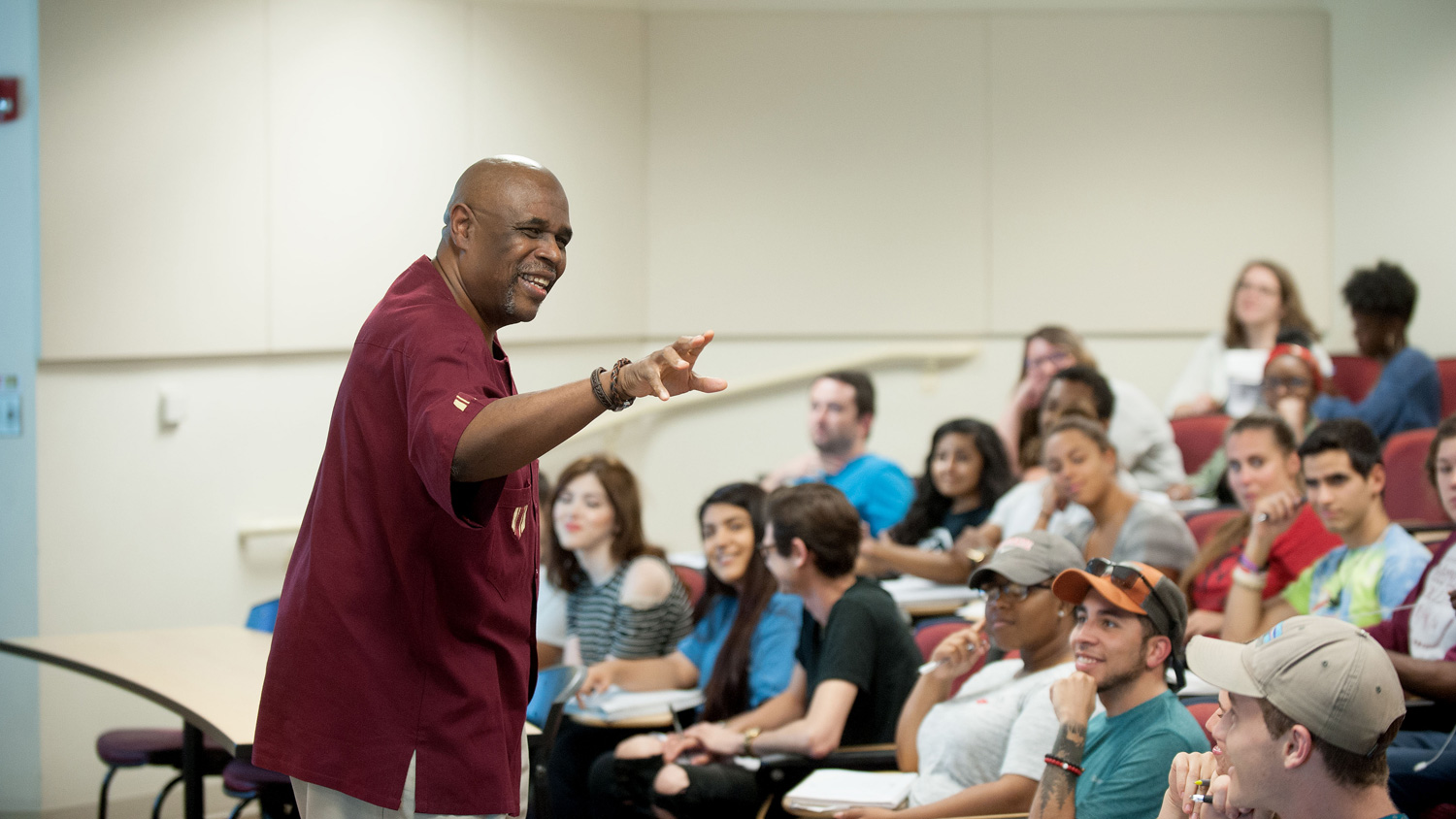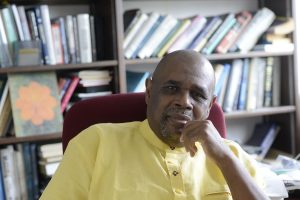Many Faces, One Wolfpack

Across almost three decades at NC State, Rupert Nacoste has witnessed a lot of change in the campus community.
“When I came here in 1988, we did not have a GLBT [Gay, Lesbian, Bisexual and Transgender] Center,” said Nacoste, Alumni Distinguished Undergraduate Professor in the Department of Psychology. “Women made up closer to a third of the campus. You did not see a lot of brown people. And I don’t think I ever saw a hijab in my first couple of years here.”

This was true at many universities three decades ago, but it doesn’t take much more than just looking around the room at the 60 students in Nacoste’s Psychology of Interdependence and Race class to see that a lot is different now. “The look of the students has changed; the dynamic in classrooms has changed,” he said. “Now we have on this campus all kinds of people, and all kinds of people who demand to be acknowledged.”
Nacoste, author of the 2015 book Taking on Diversity: How We Can Move From Anxiety to Respect, has played a big role in helping NC State talk about what it means to create a community that not only acknowledges all kinds of people but also makes them feel welcome.
In his course, which looks at how interpersonal interactions are influenced by race and other identities, he encourages open dialogue by sharing stories from his own life, including growing up in segregated schools in Louisiana and dealing with racial tensions while serving on board a naval ship in the 1970s. His classroom is a safe space where students — especially those new to the campus — often share their feelings of being overwhelmed by interactions with types of people they haven’t encountered before coming to NC State.
Nacoste was chosen to deliver the convocation address to incoming freshmen in August. In his speech, he encouraged students to overcome their anxieties and be open and responsible citizens of the “big town” of NC State.
His best piece of advice? Interact with each person you encounter as an individual, not as a representative of a group.
“Once you give students a framework through which to understand their anxiety, they rise to the occasion,” Nacoste said. “I’ve seen students figuring it out and relaxing into their social interactions — and then benefiting from them.”
Cultivating a Climate
Nacoste’s classroom isn’t the only setting in which members of the campus community are dialoguing about diversity. And encouragement to do so is coming from the top down. As Chancellor Randy Woodson wrote in a message to campus in August, “NC State’s strength comes from its people — all its people — and their diversity of thought and experience. . . . It is all our responsibility to embrace and ensure a diverse, inclusive campus culture.”
The Office of Institutional Equity and Diversity (OIED) is working to encourage more conversations and build this kind of environment for each member of the Wolfpack. The office was restructured in 2011 to centralize many diversity-related units, fostering collaboration and pooling resources. “One of the elements that brought me to NC State is the unique organizational structure of OIED, which strengthens diversity and equity efforts at the university by bringing them together under common leadership,” says Vice Provost Linda McCabe Smith.
A main function of the office is to increase cultural competence on campus to help members of the NC State community more successfully interact with people of different identities and backgrounds. In response to a recommendation from the University Diversity Advisory Committee, OIED is currently preparing to provide cultural competence training for faculty and staff.
Another major effort for OIED has been the Bias Incident Response Team (BIRT), launched in spring 2017. BIRT supports people affected by alleged incidents of bias on and around campus by providing a process for reporting those incidents, even if they do not violate a law or a university policy or code of conduct. These reports allow the university to examine the details of the incidents and offer resources to the campus community to help prevent similar occurrences in the future, said Reggie Barnes, OIED’s senior director for campus community centers and the BIRT coordinator.
“As we continue to promote BIRT, we expect to see more incidents reported and look forward to offering restorative practices, measures separate from any conduct process that are designed to foster intentional conversation and heal the environment when incidents occur,” Barnes said.
In addition to these new efforts, OIED continues to sponsor student groups and programming that encourage open conversations around diversity. The four campus community centers that OIED oversees — the African American Cultural Center, the GLBT Center, Multicultural Student Affairs and the Women’s Center — provide places where students can gather and programming to encourage dialogue around issues concerning members of these groups.
This October 22-28, NC State’s seventh-annual Diversity Education Week — featuring more than 20 performances, panel discussions, lectures and cultural activities — will highlight these conversations for the entire campus community. The week is designed to increase awareness of diverse cultures and foster intercultural understanding.
Everybody Here Is Wolfpack
The goal of all these efforts is to help each person at NC State feel like an accepted and valued part of the Wolfpack family — and to embrace their own role in strengthening that family.
Nacoste concluded his convocation address by highlighting the breadth of ethnicities, nationalities, orientations and religions that make up the campus community. As he named some of them in turn, the students called back, “Wolfpack!” To cheers from the crowd, Nacoste declared, “Everybody here is Wolfpack.”
While bigotry and ignorance may always exist, Nacoste has been impressed by the increasing willingness of NC State students to work at understanding one another. “I’ve seen students become more open and take on things they never thought they would take on,” he said.
The power of public universities to bring together people from diverse backgrounds and foster conversation and understanding has become even more important recently, in a time of increased political, racial and cultural tensions in the U.S.
“One of the important things about being [at NC State] is that you learn to deal with those kinds of tensions,” said Nacoste. “We have problems. But we deal with them.”
- Categories:


